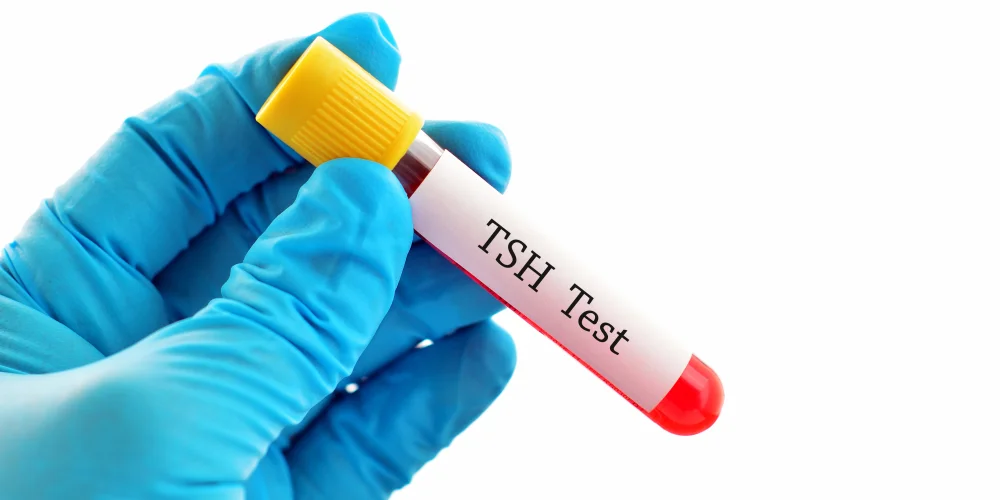TSH Test
Essential for Thyroid Function Evaluation
It is the Thyroid Stimulating Hormone Test an important test used for diagnosing the thyroid’s function and to identify thyroid conditions. Thyroid Stimulating Hormone is created by the pituitary gland. It is responsible for the creation of hormones thyroid (T3 T3 and T4) through the thyroid gland. The test measures the concentration of Thyroid Stimulating Hormone in blood samples and provides valuable information about the functioning and health of the thyroid gland.

When is the TSH Test Prescribed?
TSH Test is a test that can be used to determine the test is prescribed in different clinical situations:
- The symptoms of thyroid disorders Examine : Signs such as symptoms like fatigue, weight fluctuations or loss of hair, pulses and mood swings that could indicate thyroid problems.
- Diagnostics of Thyroid Disorders : To diagnose conditions such as hypothyroidism (underactive thyroid) as well as hyperthyroidism (overactive thyroid).
- Monitor Thyroid Treatment : For patients who receive treatments for thyroid issues This test can help monitor the efficacy of treatment and help adjust dosages of medication.
- Routine health check-ups : In the course of regular health screenings, particularly for those who are at risk for thyroid problems due to family histories or any other reason.
- Pregnancy and Monitoring : To ensure optimal thyroid function. It is vital for the development of the fetus as well as the health of motherhood.
Preparation for the TSH Test
There is no special preparation required to undergo testing the Thyroid Stimulating Hormone Test. Patients are able to eat and drink normal prior to the test. But it’s important to inform your physician regarding any medication or supplement that you’re taking as certain medicines can impact thyroid hormone levels, which can affect the results of your test. It isn’t always necessary to fast However, following your physician’s specific guidelines ensures that you get the most accurate results.
Parameters Considered During TSH Test
The Thyroid Stimulating Hormone Test mostly measures the levels of Thyroid Stimulating Hormone in the blood. Test results can help determine whether thyroid glands are working normally
- High TSH levels : It indicates that thyroid is inactive (hypothyroidism).
- Lower TSH levels : This suggests that the thyroid is too active (hyperthyroidism).
These parameters give a full view of the health of your thyroid and help healthcare professionals identify thyroid issues and create treatments to suit their needs.
Time Required for TSH Test Report
It is important to note that the Thyroid Stimulating Hormone Test is a relatively simple process. When a blood sample is taken, results will be accessible within the next day. This speedy turnaround time permits health professionals to quickly assess thyroid function, and then recommend treatment, or additional testing when needed.
TSH Test Price
In Chirayu Super Speciality Hospital, Chirayu Super Speciality Hospital, the Thyroid Stimulating Hormone Test price is 350 rupees. This affordable option provides access to vital diagnostic tests that test thyroid function. This test can aid in the timely detection and treatment of thyroid issues.
Book an Appointment for TSH Test
Scheduling an appointment to take your Thyroid Stimulating Hormone test in Chirayu Super Speciality Hospital is simple and quick. It is possible to schedule your test on our site or reach out to our staff. We’re dedicated to providing rapid, efficient assistance to fulfill your healthcare requirements and provide a smooth service for our patients.
What Our Patients Say
Hear from our valued patients about their experiences at Chirayu Super Speciality Hospital and how our care has made a positive impact on their health and well-being.


Trustworthy healthcare partner for all my diagnostic testing needs, including thyroid function tests.


Knowledgeable staff and seamless experience with Chirayu thyroid function tests.


The TSH test was crucial in diagnosing my chronic fatigue and weight issues.


Chirayu TSH test revealed my imbalance, guiding necessary lifestyle and medication changes.


The comprehensive TSH test at Chirayu was thorough, leading to an accurate diagnosis and effective treatment.


Accurate and timely results from the TSH test improved my thyroid health significantly.
Frequently Asked Questions
Here, we provide answers to some of the most commonly asked questions to help you better understand our services, policies, and facilities. If you have any additional questions, please do not hesitate to contact us.
Normal ranges can vary slightly between laboratories, but generally, TSH ranges from 0.4 to 4.0 mIU/L. Consult your healthcare provider for specific reference ranges.
Treatment depends on the type of thyroid disorder. Hypothyroidism is typically treated with synthetic thyroid hormone (levothyroxine), while hyperthyroidism may be managed with antithyroid medications, radioactive iodine, or surgery.
Yes, maintaining a balanced diet, managing stress, and avoiding iodine-deficient or excessive diets can help support thyroid health. Always discuss lifestyle changes with your healthcare provider.
The test involves a simple blood draw, which carries minimal risks such as slight bruising or discomfort at the puncture site.
The frequency depends on your health status and risk factors. Patients with known thyroid disorders may require regular monitoring, while others may need testing as part of routine health check-ups. Consult your healthcare provider for personalized advice.